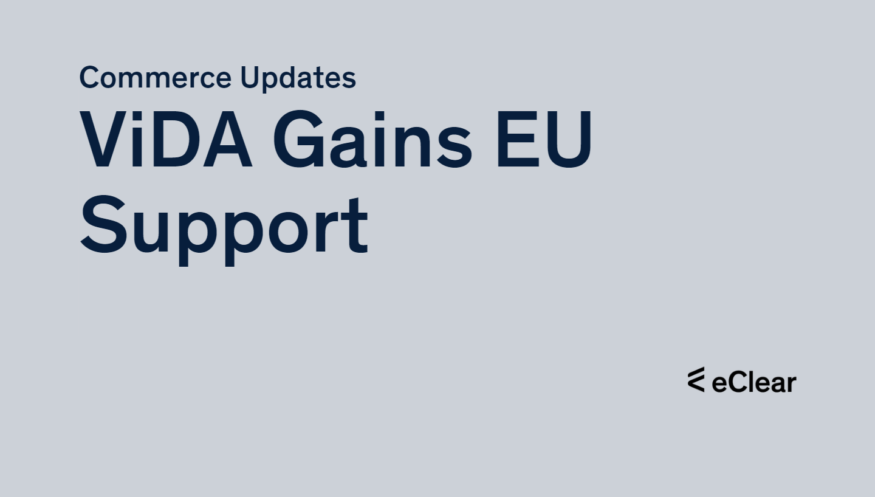EU Finance Ministers have broadly agreed to the European Commission’s proposed VAT in the Digital Age (ViDA) reforms during the Economic and Financial Affairs Council (ECOFIN) meeting. The reforms aim to harmonise digital reporting for intra-community supplies based on structured e-invoicing. However, concerns about the 2028 launch date and the development costs for taxpayers and authorities were raised.
Calls for More Flexibility in Domestic Reporting
Despite the general agreement, several states, including Italy, Poland, the Czech Republic, The Netherlands, Estonia, and Lithuania, believe that member states should have more flexibility on domestic reporting. They argue that countries should be able to set their standards to reflect costs and existing plans.
Mixed Reactions to Platform Economy Pillar
The Platform Economy pillar, which introduces a deemed supplier model for the ride and accommodation-sharing platforms, received mixed reactions. While most countries supported the proposal, concerns were raised about potential distortions of competition and neutrality.
Questions Over ‘Deemed Supplier’ Extension
The Single VAT Registration and the OSS extension were well-received. Still, some states questioned the potential disproportionate ‘deemed supplier’ extension on e-commerce platforms for EU-resident sellers’ goods sales.
Concerns Over Digital Reporting Requirements
The Digital Reporting Requirements (DRR) pillar, which mandates structured e-invoicing and digital reporting of intra-community supplies B2B transactions by suppliers and acquirers to their national tax authorities, received support for its objectives. However, many parties expressed concerns about the short timetables and associated costs, particularly for small enterprises.
Next Steps
The Swedish Presidency of the Council presented compromise texts on all three aspects of the proposals. Spain will forward the proposals, with a final agreement targeted for the ECOFIN meeting on 17 October 2023.
EU Aims to Simplify Withholding Tax Procedures

The European Commission has proposed new EU rules to streamline and secure withholding tax procedures for investors, financial intermediaries, and Member State tax administrations. This move is vital to the Communication on Business Taxation for the 21st Century and the Commission’s 2020 Action Plan on the Capital Markets Union. The initiative aims to promote fairer taxation, combat tax fraud, and support cross-border investment throughout the EU.
Withholding tax is the tax paid by an investor residing in one EU Member State on the interest or dividends earned in another Member State. Many EU Member States have signed double taxation treaties to avoid double taxation. However, the current refund procedures are often lengthy, costly, and cumbersome, discouraging cross-border investment within and into the EU.
The proposed actions include a joint EU digital tax residence certificate to make withholding tax relief procedures faster and more efficient. Two fast-track procedures, a “relief at source” procedure and a “quick refund” system, will also be introduced to make the relief process faster and more harmonised across the EU.
A standardised reporting obligation will provide national tax administrations with the tools to check eligibility for the reduced rate and detect potential abuse. Certified financial intermediaries will be required to report the payment of dividends or interest to the relevant tax administration.
These standardised procedures are estimated to save investors around €5.17 billion annually. The proposal is expected to come into force on 1 January 2027 once adopted by Member States.
EU’s Green Deal: CBAM Consultation Launched

The European Commission has initiated a consultation on the rules for implementing the Carbon Border Adjustment Mechanism (CBAM). The consultation, which will run until 11 July 2023, focuses on the transition period that commences on 1 October this year and concludes at the end of 2025.
The draft implementing regulation, which has been published, outlines the reporting obligations and information required from EU importers of CBAM goods. It also provides a provisional methodology for calculating the emissions released during the manufacturing process of CBAM goods.
The CBAM is a key element of the European Green Deal and aims to prevent carbon leakage by putting a carbon price on imports of certain goods from outside the EU. The mechanism encourages producers within and outside the EU to reduce carbon emissions while ensuring all businesses operate on a level playing field.
The consultation period provides an opportunity for stakeholders to provide feedback and contribute to the shaping of the CBAM rules. The outcomes of the consultation will be crucial in determining the effectiveness of the CBAM in achieving its environmental objectives while ensuring fairness and compliance with World Trade Organization rules.
Swiss say yes to 15% minimum tax for large corporations

In a referendum, over three-quarters of Swiss citizens voted to favour a global minimum tax. The tax is to apply to companies with an annual turnover of at least 750 million euros, reports wiwo.de. The Swiss government and parliament plan to introduce a special supplementary tax to increase the overall tax burden to 15 per cent. This reform requires an amendment to the Federal Constitution and, therefore, a referendum.
Switzerland and about 140 other countries have committed to implementing the global minimum tax adopted by the Organisation for Economic Cooperation and Development (OECD). The bill was hardly controversial in Switzerland, and all the major business associations had come out in favour.
The Social Democrats were the only major party to oppose the proposal. While they also favour a regulation against tax dumping, they oppose that 75 per cent of the expected additional tax revenues should flow to the cantons, which would fuel tax competition.
The proposed supplementary tax would affect about 200 globally active Swiss companies and about 2000 subsidiaries of large international corporations in Switzerland. The government expects additional annual revenues of between one and 2.5 billion Swiss francs.
Deutsche Post DHL Group becomes DHL Group

The world’s leading logistics company, Deutsche Post DHL Group, has announced that it will change its Group name to “DHL Group” on 1 July 2023. This change reflects the business portfolio’s internationalisation and the DHL brand’s global visibility, which now accounts for more than 90% of Group revenue. The new name reflects the focus on national and international logistics activities as a driver for future growth.
Tobias Meyer, CEO of DHL Group, emphasises that the megatrends of globalisation, e-commerce, digitalisation, and sustainability have positively impacted the business and will continue to do so. He adds that the renaming to DHL Group follows the development of the company’s business activities, which outside Germany almost only uses the DHL brand.
The Deutsche Post and DHL brands will remain unchanged in Germany. “We are very proud of Deutsche Post’s tradition, its rich heritage and history, which goes back to the 15th century,” says Tobias Meyer. “We value the Deutsche Post brand and will continue to use it in our joint branding with DHL. We will remain ‘Die Post für Deutschland’.”
The stock exchange abbreviation, currently ‘DPW’, will be changed to ‘DHL’ to better position the company’s global portfolio in the financial markets and leverage the strong recognition of the DHL brand there. The change of the Group name does not affect the names or characteristics of the legal entities of the Group, in particular Deutsche Post AG, or the internal and external relationships with these entities.
The Group will use the name DHL Group in its internal and external communications and presentation from 1 July 2023. Rebranding some physical assets will only occur over time to avoid additional costs.
ABOUT YOU expands second-hand offer with momox

The online fashion retailer ABOUT YOU is expanding its second-hand offer, “Second Love”, through a partnership with the re-commerce company momox. The cooperation will quadruple the second-hand assortment on aboutyou.de in the coming months. This will give customers a greater choice of alternatives to the assortment of new goods.
The cooperation between ABOUT YOU and momox fashion is a further step towards the circular economy and extending the life cycle of clothing. Tarek Müller, co-founder and co-CEO of ABOUT YOU, emphasises that the partnership creates valuable synergies and promotes a more sustainable approach to fashion.
The momox fashion range, consisting of women’s and men’s items, will be available on aboutyou.de in the coming months. Heiner Kroke, CEO of momox SE, sees the cooperation as an essential step towards offering customers even broader access to their products and positioning the more sustainable option for fashion and circular economy more strongly in Germany.
Spain’s VAT Cut on Food to Continue

Spain’s Economy Minister Nadia Calvino has announced that the country will not reinstate the value-added tax (VAT) on essential food items until price levels become “more appropriate”, reports Zawya.com. This comes as part of the government’s efforts to ease the effects of price rises on consumers.
At the start of the year, the Spanish government eliminated the VAT on essential foods such as bread, cheese, milk, fruit, vegetables, and cereals, previously at 4%. This measure was part of a €10 billion package approved in December to mitigate the impact of price increases on consumers. Still, it was only intended to last until the end of June.
However, Calvino confirmed that the government would maintain the VAT rate cut and is considering which other measures could be extended beyond June. She highlighted that Spain had seen the sharpest fall in inflation, with a decrease of 5 percentage points in five months, making it one of the countries with the lowest inflation.
Despite this, according to data from the National Statistics Institute, food and non-alcoholic beverage prices have risen by 12.9% in the 12 months through April. This rate is 3.5 percentage points higher than in the 12 months through March.
The announcement comes ahead of a snap general election in Spain on 23 July, following the ruling Socialist Party’s defeat in municipal and regional votes on 28 May.







